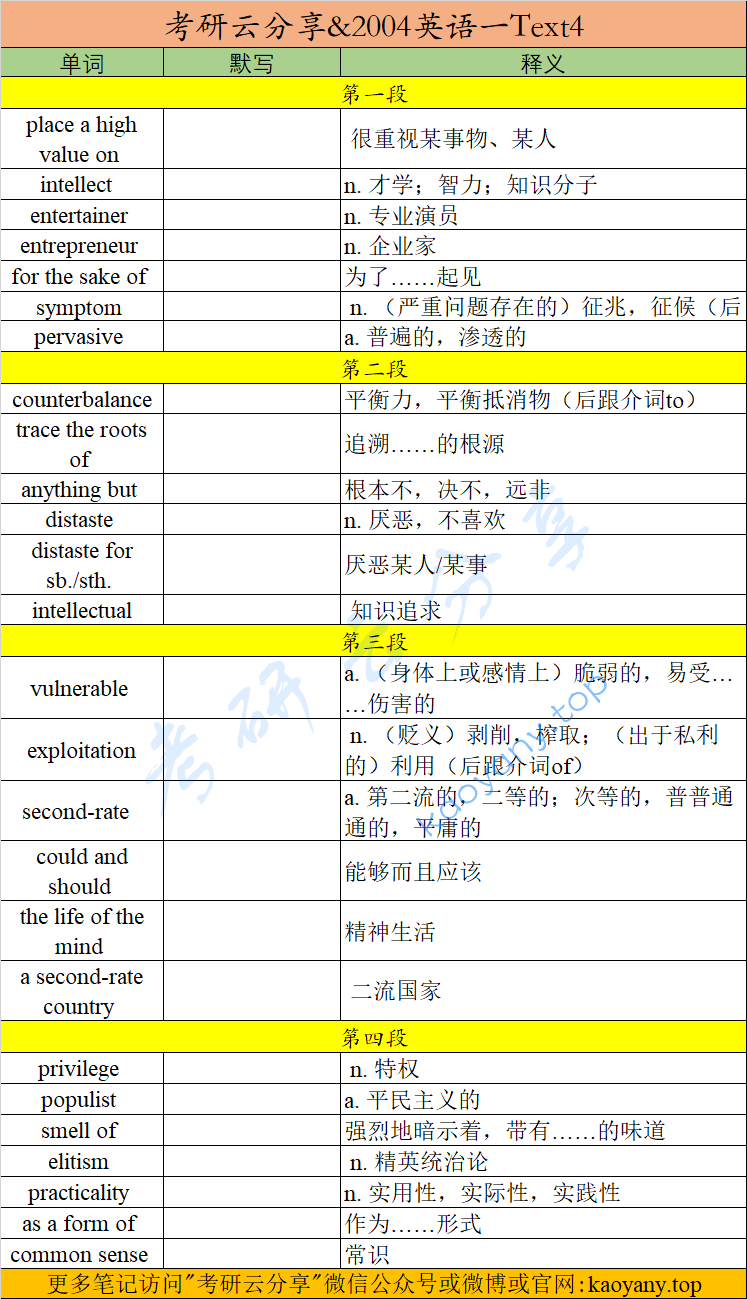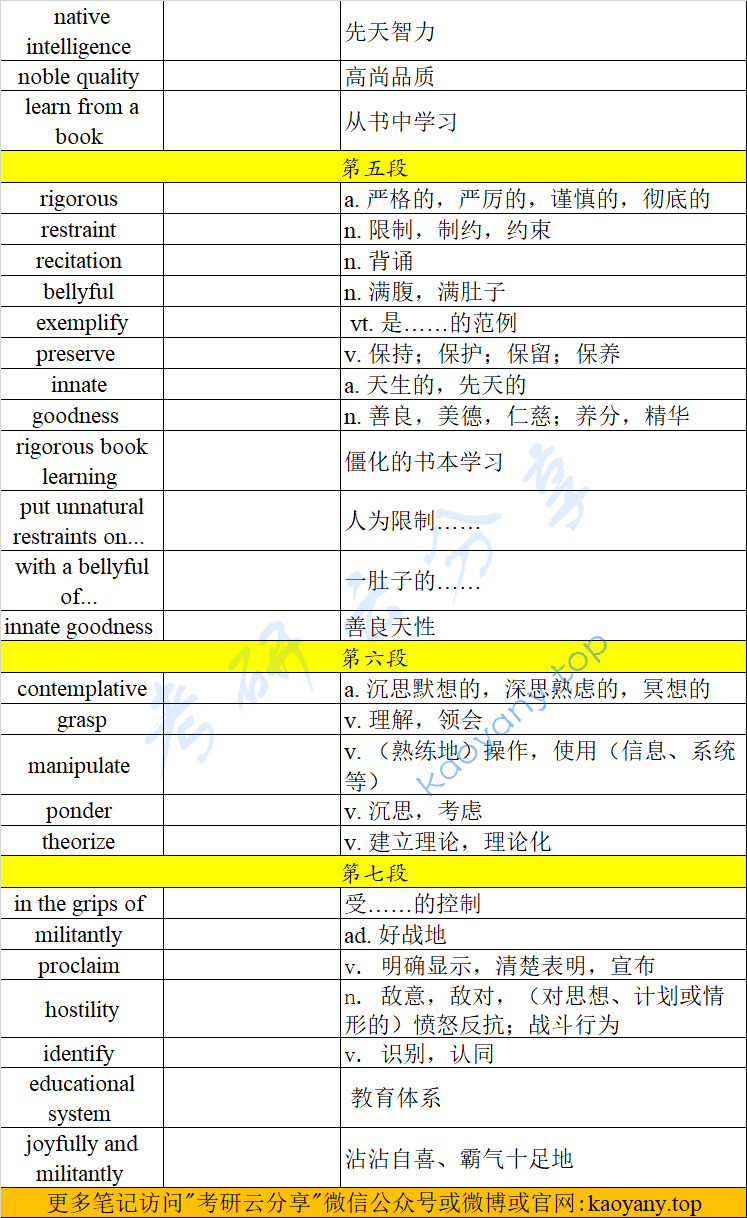第一段
①Americans today don't place a very high value on intellect.②Our heroes are athletes, entertainers, and entrepreneurs, not scholars.③Even our schools are where we send our children to get a practical education—not to pursue knowledge for the sake of knowledge.④Symptoms of pervasive anti-intellectualism in our schools aren't difficult to find.
单词&词组
place a high value on 很重视某事物、某人
intellect n. 才学;智力;知识分子
entertainer n. 专业演员
entrepreneur n. 企业家
for the sake of 为了……起见
symptom n. (严重问题存在的)征兆,征候(后跟介词of)
pervasive a. 普遍的,渗透的
本段翻译
今天的美国人不太重视才智了。我们心中的英雄是运动员、演艺人士和企业家,而不是学者。甚至我们的学校也只是我们送孩子去接受实用教育而不是为了知识而去求知的地方。不难发现反才智主义症状在我们的学校里普遍存在。
第二段
①“Schools have always been in a society where practical is more important than intellectual,” says education writer Diane Ravitch.②“Schools could be a counterbalance.” Ravitch's latest book,Left Back: A Century of Failed School Reforms,traces the roots of anti-intellectualism in our schools,concluding they are anything but a counterbalance to the American distaste for intellectual pursuits.
单词&词组
counterbalance n. [一般用单数]平衡力,平衡抵消物(后跟介词to)
trace the roots of 追溯……的根源
anything but 根本不,决不,远非
distaste n. 厌恶,不喜欢
distaste for sb./sth. 厌恶某人/某事
intellectual pursuit 知识追求
本段翻译
“学校一直处于一个重实用而轻才智的社会中,”教育作家戴安·拉维奇说,“学校原本可以成为一种抗衡力。”拉维奇新作《落后:学校改革失败的一个世纪》追溯了我们学校里反才智主义的根源,并得出结论:美国学校绝没有成为一种抗衡美国人厌恶才智追求的力量。
第三段
①But they could and should be.②Encouraging kids to reject the life of the mind leaves them vulnerable to exploitation and control.③Without the ability to think critically, to defend their ideas and understand the ideas of others, they cannot fully participate in our democracy.④Continuing along this path,says writer Earl Shorris, “We will become a second-rate country.⑤Wewill have a less civil society.”
单词&词组
vulnerable a. (身体上或感情上)脆弱的,易受……伤害的
exploitation n. (贬义)剥削,榨取;(出于私利的)利用(后跟介词of)
second-rate a. 第二流的,二等的;次等的,普普通通的,平庸的
could and should 能够而且应该
the life of the mind 精神生活
a second-rate country 二流国家
本段翻译
然而,学校原本可以并且也应该做到这一点。鼓励孩子们排斥精神生活,会使他们很容易被利用和控制。如果缺乏批判性思考、捍卫自己思想和理解他人观点的能力,他们就不能够充分参与我们的民主生活。作家厄尔·绍利斯说:“沿着这条路走下去,我们会变成一个二流国家,公民社会的程度将会降低。”
第四段
①“Intellect is resented as a form of power or privilege,” writes historian and professor Richard Hofstadter in Anti-intellectualism in American Life,a Pulitzer-Prize winning book on the roots of anti-intellectualism in US politics,religion,and education.②From the beginning of our history, says Hofstadter, our democratic and populist urges have driven us to reject anything that smells of elitism.③Practicality, common sense, and native intelligence have been considered more noble qualities than anything you could learn from a book.
单词&词组
privilege n. 特权
populist a. 平民主义的
smell of 强烈地暗示着,带有……的味道
elitism n. 精英统治论
practicality n. 实用性,实际性,实践性
as a form of 作为……形式
common sense 常识
native intelligence 先天智力
noble quality 高尚品质
learn from a book 从书中学习
本段翻译
“才智被当作一种权力或特权而遭到厌弃,”历史学家理查德·霍夫斯坦特教授在《美国生活中的反才智主义》中这样写道。这本书曾获普利策奖,探讨了美国政治、宗教和教育领域中反才智主义的根源。霍夫斯坦特说,自我国历史之初,我们对于民主和平民主义的渴望就驱使我们拒绝任何带有精英优越论味道的东西。讲究实际、常识、先天智力被看作比任何能从书本中学到的东西都高尚的品质。
第五段
①Ralph Waldo Emerson and other Transcendentalist philosophers thought schooling and rigorous book learning put unnatural restraints on children: “We are shut up in schools and college recitation rooms for 10 or 15 years and come out at last with a bellyful of words and do not know a thing.”②Mark Twain's Huckleberry Finn exemplified American anti-intellectualism.③Its hero avoids being civilized-going to school and learning to read-so he can preserve hisinnate goodness.
单词&词组
rigorous a. 严格的,严厉的,谨慎的,彻底的
restraint n. 限制,制约,约束
recitation n. 背诵
bellyful n. 满腹,满肚子
exemplify vt. 是……的范例
preserve v. 保持;保护;保留;保养
innate a. 天生的,先天的
goodness n. 善良,美德,仁慈;养分,精华
rigorous book learning 僵化的书本学习
put unnatural restraints on... 人为限制……
with a bellyful of... 一肚子的……
innate goodness 善良天性
本段翻译
拉尔夫·沃尔多·爱默生和其他一些先验主义哲学家认为学校教育和严苛的书本学习限制了孩子们的天性。“我们被关在中小学和大学教室里死读10~15年,最后出来满肚子墨水,却什么也不懂。”马克·吐温的《哈克贝利·费恩历险记》展现了美国的反才智主义。这本书的主角拒绝被教化——不上学,不学习读书写字—―这样他就能保持自己善良的本性。
第六段
①Intellect, according to Hofstadter, is different from native intelligence, a quality we reluctantly admire.②Intellect is the critical, creative, and contemplative side of the mind.③Intelligence seeks to grasp, manipulate, re-order, and adjust, while intellect examines, ponders, wonders, theorizes, criticizes, and imagines.
单词&词组
contemplative a. 沉思默想的,深思熟虑的,冥想的
grasp v. 理解,领会
manipulate v. (熟练地)操作,使用(信息、系统等)
ponder v. 沉思,考虑
theorize v. 建立理论,理论化
本段翻译
按照霍夫斯坦特的观点,才智同我们所不情愿赞赏的那种天生的智力有所不同。才智指的是人精神世界中批判、创造和思考的一面。智力寻求的是理解、运用、整合和调节,而才智是审视、思考、怀疑、形成理论、批判和想象。
第七段
①School remains a place where intellect is mistrusted.②Hofstadter says our country's educational system is in the grips of people who “joyfully and militantly proclaim their hostility to intellect and their eagerness to identify with children who show the least intellectual promise.”
单词&词组
in the grips of 受……的控制
militantly ad. 好战地
proclaim v. 明确显示,清楚表明,宣布
hostility n. 敌意,敌对,(对思想、计划或情形的)愤怒反抗;战斗行为
identify v. 识别,认同
educational system 教育体系
joyfully and militantly 沾沾自喜、霸气十足地
本段翻译
学校仍然是一个才智受到怀疑的地方。霍夫斯坦特说我们国家的教育体制掌握在这样一群人的手中,“他们沾沾自喜、霸气十足地公然宣称对才智的敌意,且迫不及待地表示出对那些在才智上没有前途的孩子们的认同。
五道题
36. What do American parents expect their children to acquire in school?
[A] The habit of thinking independently.
[B] Profound knowledge of the world.
[C] Practical abilities for future career.
[D] The confidence in intellectual pursuits.
37. We can learn from the text that Americans have a history of________.
[A] undervaluing intellect.
[B] favoring intellectualism.
[C] supporting school reform.
[D] suppressing native intelligence.
38. The views of Raviteh and Emerson on schooling are ______.
[A] identical.
[B] similar.
[C] complementary.
[D] opposite.
39. Emerson, according to the text, is probably _________.
[A] a pioneer of education reform.
[B] an opponent of intellectualism.
[C] a scholar in favor of intellect.
[D] an advocate of regular schooling.
40. What does the author think of intellect?
[A] It is second to intelligence.
[B] It evolves from common sense.
[C] It is to be pursued.
[D] It underlies power
参考答案
CADBC
答案解析
36、【定位】第一段③句指出, 美国父母送孩子去学校是为了接受实用教育(to get apr acc al education) ——而不是为了追求知识本身(not to pursue knowledge for the sake of knowledge) ”, 可以得出答案为[C],同时排除[B]。
37、【定位】根据标志词have a history可以定位到第四段(From the beginning of our history...) 。该段指出:美国具有“拒绝有精英优越论味道的事物”的传统,具体表现:重实用性、常识、先天智力;轻书本知识、厌弃才智,可见[A]正确,同时排除[D]。
38、【定位】第二段阐述Ravitch观点:美国社会历来存在“重实用、轻才智”的错误风气;学校本应成为抗衡力量, 事实却是完全没起到作用。可见, Rav tch重视学校教育, 认为它应该是培养才智之地。第五段则阐述Emerson观点:学校教育和书本学习限制了孩子的天性;多年学校教育之后学生往往是空有满腹经纶、却对现实一无所知, 可见Emerson否定学校教育的作用。二者态度完全相反, [D] 正确。
39、【定位】从第五段对爱默生观点的阐释可知,他对学校教育和书本知识持否定态度,认为它们限制了孩子的天性、并不能带给孩子能力。从下文来看,该内容为对爱默生观点的举例说明:避免被教化(不上学、不读书)以保持善良的本性。可见,爱默生是反才智主义者,[B]正确,同时排除[C].
40、【定位】文章第一段提出问题,美国人并不重视才智,反才智症状在学校里普遍存在。随后分析这种反才智现象的影响(使得孩子们缺乏批判思考的能力,无法真正参与公民社会,从而导致美国沦为二流国家)。随后追溯反才智主义的历史根源,指出其源于美国极端的反精英论传统。最后转而回归当下,指出美国的教育体制问题“反对才智,认同无才智者”。可见作者从头至尾一直在批判轻视才智的做法,即:高度赞扬才智、充分认可其作用、认为应将其作为追求对象,[C]正确。


- 单词 词组
- 本段翻译
- 单词 词组
- 本段翻译
- 单词 词组
- 本段翻译
- 单词 词组
- 本段翻译
- 单词 词组
- 本段翻译
- 单词 词组
- 本段翻译
- 单词 词组
- 本段翻译
- 参考答案
- 答案解析
